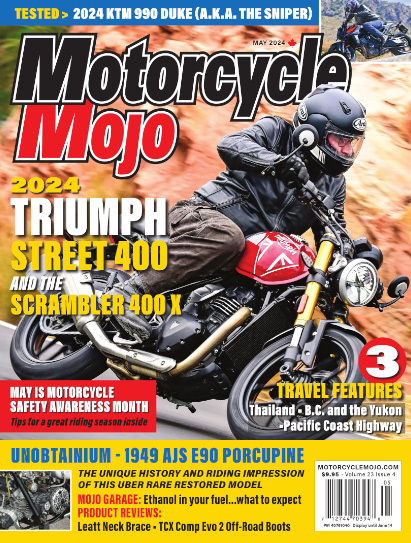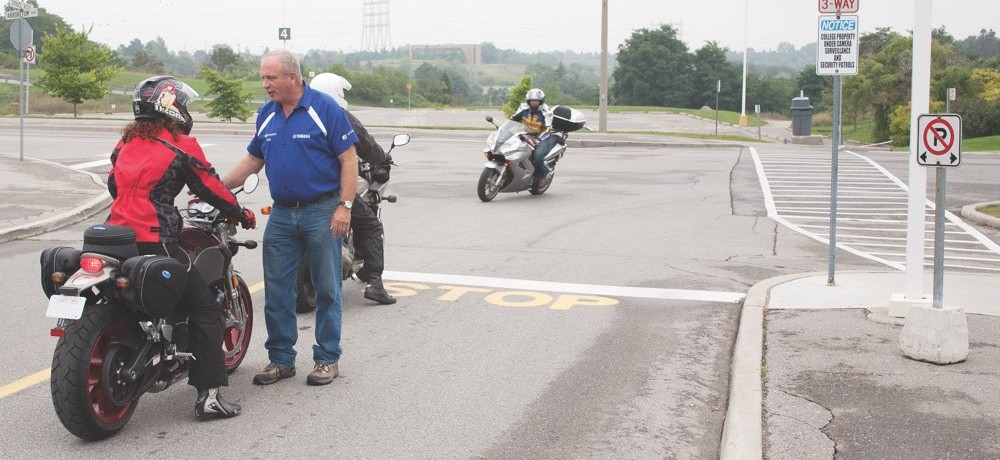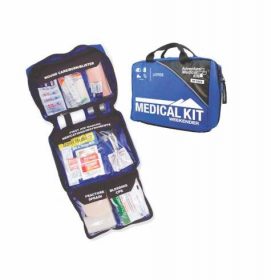May is Motorcycle Safety Awareness Month, so we thought it prudent to offer up some sobering facts and a few tips that may just save your life.
The sun sank behind the horizon as the rain grew heavier. I could only see the red glow from the taillight of the bike ahead and the meek scope of illumination that my bug-plastered headlight offered. A silhouette appeared from the ditch and crept onto the road. The bike ahead blocked my vision of the creature until it was too late. I could hear the sounds of sliding rubber and could feel it vibrating through my bones as my wheels locked up, and I felt a crushing impact on the front of my bike. I tried to scream, but all that came out was a distorted whimper. I knew instantly what I had hit; I didn’t want it to be true. My heart racing, I looked at the front of my bike immersed in blood and wisps of brown fur jamed into crevices, including my front tire and rim.
I did what every motorcyclist dreads: I hit a deer. I was lucky enough to kill the animal, keep the motorcycle up and ride away with a small fracture on my foot from the animal swinging around and smashing my foot against an engine case. I also rode away with a stark idea of the overlooked risks associated with motorcycling.
A recent study from Transport Canada stated that motorcyclists made up 10.9 per cent of fatalities in Canada, even though they only make up about two per cent of road users. The romanticism of motorcycling wears thin with the thought of how quickly one of many factors can change our lives through one ride. Motorcycling can be unkind to many.
Thinking of Warmer Days

To get a well-rounded scope of what injuries motorcyclists often deal with, I spoke with Adam Calver, a motorcyclist who spent most of his career working as a firefighter and paramedic. Needless to say, he’s seen a lot. More recently, Calver has started a motorcycle-specific first-aid course called Head-On First Aid and Safety, and it revolves around the most common motorcycle-related injuries.
“Some of the most common injuries that first responders see are road rash, shoulder and rib injuries and, of course, lots of fractures,” Calver says, noting the most common involve tailbones, wrists, legs and arms. “We’ve all been warned of road rash, and if you’ve ever had it or seen treatment for it, you can understand why nobody would wish this upon their worst enemy.”
Shoulders are arguably the most vulnerable joint in the body; torn ligaments or dislocated shoulders are quite common – an injury I’ve experienced multiple times after a bad crash on a Timbersled.
Calvers advises, “If you don’t have first-aid experience, I’d highly suggest taking a course no matter how basic it is. It’s valuable knowledge and gets you acquainted with dealing with intense situations.”
So, now that your body aches with the thought of potential trauma that hitting the ground can cause, let’s talk about some of the things we can do to ensure we can provide ourselves with the best care, and in some cases prevent the crash in the first place.
Take a Riding Course

Know Your Gear
There are so many types of gear on the market now. Do your research and pick the gear that suits your riding style and offers well-placed protection. Don’t put a price tag on your well-being or your life; it’s worth it to spend the money on gear that offers real protection.
Helmet
Your head is the most important body part to protect. Know your helmet – is it modular? open-faced? full-faced? Can someone access your face easily after a crash? Paramedics are trained to remove helmets, but having to pull off your helmet to ensure your airway is open could increase the possibility of a spinal injury. If your helmet is a modular or open-face type, your mouth and airway are much more accessible in emergency situations. If your helmet is full-face, check to see if it has easy-to-remove cheek pads, and would therefore be easier to remove in an emergency.
Does your helmet fit your head properly? There are three main head shapes; learn which shape of helmet fits yours best. Arai, for instance, designs helmets based on these three shapes. You can definitely feel the difference in a helmet that fits properly. Make sure there is no additional space in your helmet. Any space can amplify the force of the impact into your skull. Having a helmet that’s too large can actually cause you to have two impacts: one when the helmet hits a solid object or pavement, and the other from your head hitting the interior of the helmet.
Jackets and Pants

Boots
Get a motorcycle boot that covers your ankles at minimum. For me, the taller the better. It’s best to find something with rigid ankle support, but be sure it doesn’t hinder the movement of your foot.
Gloves
Instinctively when we fall, the first thing that goes out is our hands. Gloves with an abrasion-resistant palm is important. On the top of the hand, it’s best to get something with hard knuckles to protect from falls and levers that could crush your hand.
Going Digital
Get a safety app or locator beacon. We are lucky to live in a technological world these days. There are some great apps available for your smartphone that offer crash and fall detection in addition to tracking your ride, such as EatSleepRIDE. Instead of you potentially waiting injured on the side of the road or in a ditch, an alert instantly goes out to emergency services with your location once the app senses a crash, as determined by complex algorithms.
If you’re travelling to more remote areas, you might want to look into purchasing a satellite beacon like a SPOT satellite GPS messenger or a Garmin inReach unit. A location beacon can be more useful, especially if you find yourself on the dusty trail more often than not and out of cell reception. You can set up key contacts who will receive your location in set intervals. Additionally, you can let them know if you’ve had a breakdown, stopped early, need help or will just be late.
However, they will not sense if you’ve had a crash – you’ll still need to physically press a button to notify emergency services.
First-Aid Kit
Anticipate the worst but hope for the best. Start off with buying a generic first-aid kit, as this will supply with you most of the equipment you’ll need. Then adapt the kit to your needs and activities. Some extras that I carry are things an antibiotic ointment, a pain reliever, an antihistamine and any prescribed medications.
Above all else, the most important thing we can do as riders is focus on the road and our surroundings. I often think about that moment I rode away from the deer carcass stretched out on the side of the road and about the split-second choices I made that placed me in that fateful situation. In the end, I made my choice and came out all right – I was lucky. The most important thing is to learn from others and ourselves in moments like that. We ride to live and live to ride, but becoming a statistic is not our end goal.


















